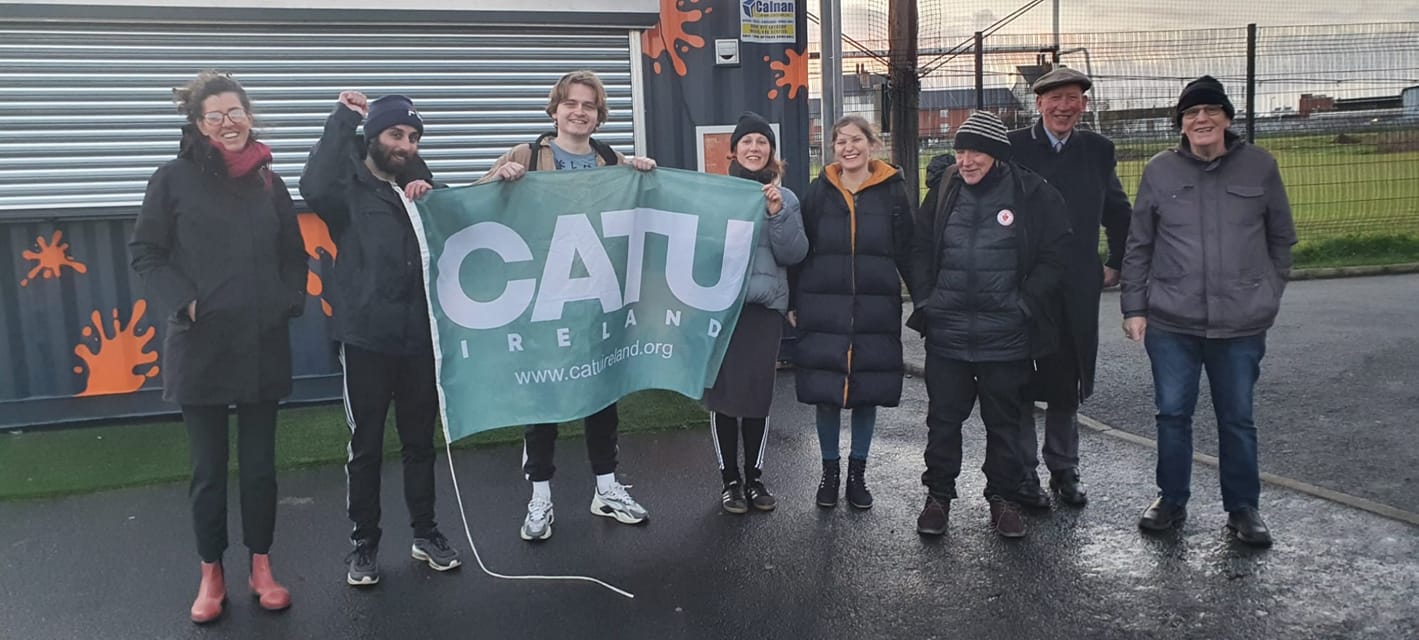It is a pretty reasonable statement to make in the context of a housing
shortage, but we need to discuss what is wrong with it.
I have been involved in tenant organizations in Ireland since 2017. The main work I have done is knocking at people’s doors and asking how their housing situation is and what they think we could do together to change it. Being
Brazilian and a woman I rarely get racist or sexist statements at the doors, which could be anticipated.
When I encounter people that could be defined as racist, I see it as an opportunity to talk. It is not something migrants want to have to deal with though, as it is very hard and we feel attacked in our own existence. However, I can see these people (defined as racists) like many people I love back in Brazil (yes, those victims of racism can also be racist, as racism is context specific). These are often kind human beings who are lovely mothers, fathers, and grandparents, who have donated to the poor in the Global South or those facing the war in Ukraine, those who go to church and follow the generous principles of God, and those who have migrant mates. All of those would have no problem with someone saying, “What is wrong with putting your own people first in your own country?”
So what is the problem with such a statement? Why is it racist? Broadly defined, race is a category created to classify people towards cultural and physical characteristics, blood lineage, and territorial commonality. When those characteristics are defined those who do not share them, are outcasts/aliens who do not belong to the main group. Those who do not share such racial features do not deserve a share of the main group’s outputs. In this sense, the statement above is racist because it claims that race is the central category to be considered when prioritizing who should access housing in Ireland.
As the category of race was developed at the birth of the modern nation-states, national identity is central to this process of belonging. Ireland knows it pretty well as it was the task of their intellectuals to develop a positive national
identity in the fight for independence. The Irish national identity had to be created. A union to fight the colonizer, the English oppressor, had to be fostered.
However, in twenty-first-century Ireland, is this the right way to unite to fight for housing? If race is an identity defined as sharing a common lifestyle/ culture (actual daily activities) not only territory and blood, why the emphasis on lineage and the country/ the territory?
It is clear by now that after the Irish independence, an Irish elite has taken control of the national state to manage their own interests (as a class) and not their own people as a whole. The housing and cost of living crisis is another chapter in that history. If those in power cared about their own or national sovereignty, why would they open the way to vulture funds?
The Irish people’s struggle for housing is, however, a class struggle that has been going on really before Ireland became a country where immigration would outnumber emigration – which happened only recently in this century. As I wrote in an article to be published with other CATU members, Aisling Hedderman, Seamus Farrell and Rosi Leopard, in the 1930s, there was a wave of direct action in Dublin led by tenants and supported by Republican organizations and militant unions under the banner of the Tenant’s League that included resisting evictions, rent strikes and challenging the new Irish state to deal with poor housing conditions and high rents. The rent strikes of the 1960s against slum conditions and evictions organised by the Dublin Housing Action Committee (DHAC) and the all Ireland National Association of Tenants Organisation (NATO) were mass movements involving thousands of tenants.
The National Association of Tenants Organisation combined a series of direct actions such as anti-eviction resistance, rent strikes and occupation of empty dwellings to house the homeless. Numerous other housing struggles have taken place against state repression, including the struggles of the Travelling community for their right to travel, camp and access appropriate accommodation and services, which have often been met with violent state repression as in the case of the Cherry Orchard evictions in the 1960s. In many parts of Dublin where there has historically been a high proportion of state-built housing, struggles to maintain public housing in the community and resist the loss of public housing against so-called regeneration has its own rich and deep history, as in the case of St. Michael’s Estate in Dublin’s South Inner City.
These experiences have provided the new housing movement with a vast repertoire of struggles to oppose old and new threats to housing justice that emerged following the 2008 crisis. However, it is still imperative to demarcate
who belongs and who doesn’t belong to the housing movement.
If we look at the Irish identity not through the lenses of territory or blood lineage but through the lenses of shared daily activities (a cultural and economic aspect) and access to the nation’s output, we can argue that
migrants, non-nationals, have much more in common with working-class Irish people and those on social welfare than with the Irish elite/ the ruling class which is profiting with the housing crisis and laughing at us, distracted fighting
against each other while they keep warm and safe at their homes.
As I mentioned, the struggle for housing comes really before migration was a
thing in Ireland. The distribution of resources has been a bone of contention
since the establishment of the Irish Free State. The division has been clear – either you belong to the class who possesses land/property or you are dispossessed. It is easier to blame those closest to us for the crisis, those that we see in our neighborhood, who are also struggling to get access to the few resources made available by the Irish state.
The challenge though is to get to those in their ivory towers, as they are far from us, their addresses are not the same,
the shops they go to are far away and their daily/cultural activities are different
or simply unaffordable.
However, it is the ruling classes that need to create scapegoats among the vulnerable such as during the 2007-8 crisis to justify cutting the public budget, the voluntary sector, and the building of public structures, hospitals, housing and transport. This strategy has been working pretty well for them. Would that work well for us though? I am sure it would not. As the working class and the impoverished, we have more in common than those in power would like us to think of, and even when we don’t have much in common, our difference is our richness. If we pray for a different God or have different skin tones, it has no influence on housing planning and provision. Our differences aren’t harmful, but they can be a strength when we use it to gather more expertise, learn from other people’s experiences, and work together to fight for housing justice. If we do not get it right when organizing and mobilizing for housing, we will just be distracting ourselves and making more harm to those in need.
It is not a housing crisis, it is an economic project to which we do not belong – we, the low-income workers, social welfare recipients, single people, single parents, the elderly, those with a disability, LGBTQIA+, ethnic minorities such
as the Irish Travellers*, migrants and asylum seekers. Do not be confused by opportunist nationalist claims, what has always made Ireland unique is its people, and its people today are not necessarily born in
Ireland. It is time to build a housing movement with the best weapons we have: 1) knowledge of our needs and what we want, 2) numbers to pressure and change, and 3) solidarity to build the Ireland we all deserve.
*The case of racism towards Travellers has not been dealt with in this article as it was written as a prompt response to the protest held against international protection applicants in a Direct Provision Centre in Ballymun on January 7th,
- However, the case of Irish Travellers shows that sharing the same territory is not enough to belong and have our rights respected. It shows that racism based on place of birth is opportunistic and made in bad faith. It is time to move beyond such abstract unifiers and support each other in the fight homes for all – where we all belong.
by Juliana Sassi, CATU Ballymun/Finglas Branch


